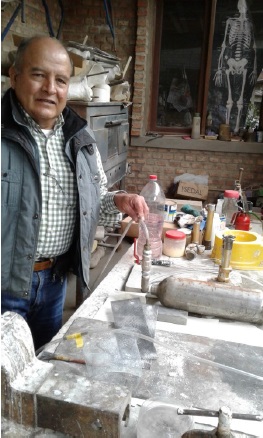
Carlos Guaman works in Orthotics and Prosthetics at CERECO and was especially interested in training for prosthetics for teenagers and children in the United States. Having a prosthetic can make a big difference in a teenager’s development. At Cereco, many of the prosthetics are improvisations and a handiwork of ingenuity, with very few materials available. Educated in the most up to date methods of rehabilitation, Bolivian prosthetists overcome the lack of equipment by creative use of appropriate technology.
Mr. Guamán has a background in mechanical engineering and he applies the biomechanics of gait to teach his patients how to walk with prostheses.
With limited material re-sources and no public health support for P&O, Mr. Guamán seeks to provide economical clinical care for his clients; also, he proactively supplements available training and education to improve standards of local P&O delivery.
Amputation in Bolivia is due to trauma, cancer, congenital amelia, or diabetes. Medical care in Bolivia does not offer interdisciplinary, team rehabilitation, so after discharge from hospital, patients must find prosthetic care without assistance and pay for their prostheses without insurance.
Mr. Guamán creatively improves his patients’ quality of life by re-purposing available and affordable materials and parts, such as tire rubber, balsa wood, leather and swivel casters intended for office chairs. Mr. Guamán can minimize costs by using leather and laces to create transtibial sockets for prostheses, “Soak leather until it is malleable and mold it on a positive cast of the residual limb. When the leather dries, it contracts. Tight lacing achieves suspension on the residual limb.”
During his two weeks in North Carolina, Carlos Guaman was able to work and train at an RTP prosthetic facility that will donate materials to him. He was also able to travel to Northwestern University for further talks and training. Carlos Guaman’s work is a testament to how people can help others with limited resources but limitless ingenuity.